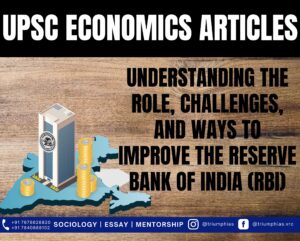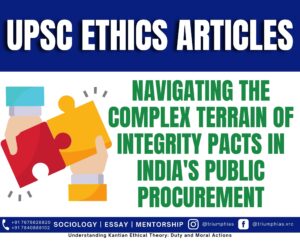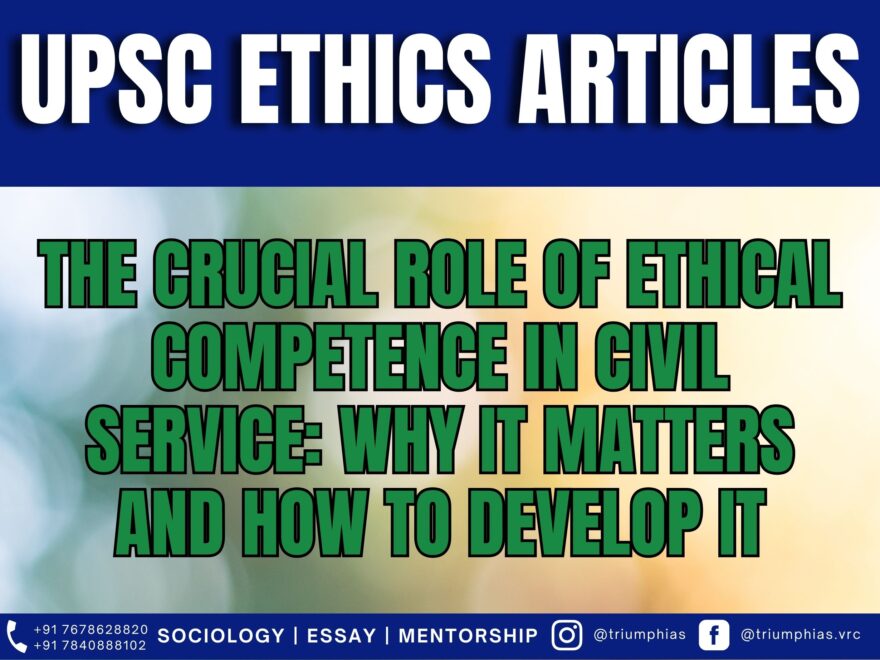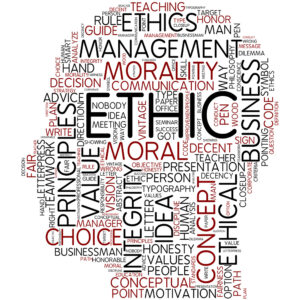Ethical Competence
(Relevant for Ethics, Integrity and Aptitude)
Ethical Competence
Ethical proficiency pertains to an individual’s capacity to comprehend, employ, and exhibit ethical standards and values in their choices and conduct. It encompasses a robust comprehension of moral principles, the capability to identify ethical quandaries, and the aptitude to make ethical decisions and behave ethically.
Ethical competence is of special relevance for a civil servant who has to act in a way which reflects the highest standards of transparency and accountability in decisions and actions.
Importance of ethical competence for a civil servant:
- Upholding Public Trust: Public servants occupy positions of public trust and serve the best interests of the community. Ethical proficiency assists them in maintaining public trust by guiding their actions with ethical principles and the collective welfare.
- Making Ethical Choices: Public servants frequently encounter intricate scenarios that demand decisions with widespread implications. Ethical competence equips them with the essential skills to navigate these dilemmas and make choices that are equitable, just, and aligned with ethical norms.
- Preventing Corruption and Wrongdoing: Ethical competence acts as a deterrent to corruption and unethical conduct within the public service. It cultivates a transparent and accountable administration by reducing vulnerability to corrupt practices.
- Enhancing Professionalism and Credibility: Ethical competence empowers public servants to fulfill their responsibilities with honesty, accountability, impartiality, and professionalism, without succumbing to personal biases, interests, or pressures.
- Advancing Accountability and Transparency: Ethical competence helps public servants comprehend the significance of accountability and transparency in their roles. They are more likely to act responsibly, report misconduct, and uphold elevated standards of integrity when they possess ethical competence.
- Cultivating a Positive Organizational Culture: Ethical competence contributes to cultivating a positive organizational culture in the public service. When public servants exemplify ethical conduct, they set a precedent for others and foster an environment that values integrity, equity, and reverence.
Ethical competence is a vital attribute for a civil servant as it helps him/her to fulfil his/her obligations towards the public interest and welfare with integrity and excellence. It also helps him/her to cope with ethical challenges and dilemmas that may arise in public service. Ethical competence can be developed through continuous learning, reflection, and practice.
Sample Question for UPSC Sociology Optional Paper:
Question 1: What is ethical competence and why is it important for civil servants?
Answer:
Ethical competence refers to the ability to understand and apply ethical standards in decision-making and conduct. For civil servants, it is crucial for maintaining public trust, making ethical choices, preventing corruption, and fostering a positive organizational culture.
Question 2: How does ethical competence contribute to accountability and transparency in public service?
Answer:
Ethical competence equips public servants with the understanding and skills to act responsibly, report misconduct, and uphold high standards of integrity, thereby enhancing accountability and transparency.
Question 3: In what ways can ethical competence deter corruption within the public sector?
Answer:
Ethical competence acts as a safeguard against corruption by reducing vulnerabilities to corrupt practices and encouraging transparent, accountable administration.
Question 4: How can ethical competence be developed and nurtured among civil servants?
Answer:
Ethical competence can be developed through continuous learning, reflection, and practice, as well as through organizational policies that emphasize ethical conduct.
Question 5: What impact does ethical competence have on the organizational culture of public service institutions?
Answer:
Ethical competence fosters a positive organizational culture by setting a precedent for integrity, equity, and respect, encouraging others to adhere to similar standards.
Related Blogs …
 |
 |
To master these intricacies and fare well in the Sociology Optional Syllabus, aspiring sociologists might benefit from guidance by the Best Sociology Optional Teacher and participation in the Best Sociology Optional Coaching. These avenues provide comprehensive assistance, ensuring a solid understanding of sociology’s diverse methodologies and techniques.
Ethical Competence, Public Service, Civil Servants, Public Trust, Professionalism, Accountability, Transparency, Anti-Corruption, Organizational Culture, Ethical Decision-making, Ethical Competence, Public Service, Civil Servants, Public Trust, Professionalism, Accountability, Transparency, Anti-Corruption, Organizational Culture, Ethical Decision-making

Choose The Best Sociology Optional Teacher for IAS Preparation?
At the beginning of the journey for Civil Services Examination preparation, many students face a pivotal decision – selecting their optional subject. Questions such as “which optional subject is the best?” and “which optional subject is the most scoring?” frequently come to mind. Choosing the right optional subject, like choosing the best sociology optional teacher, is a subjective yet vital step that requires a thoughtful decision based on facts. A misstep in this crucial decision can indeed prove disastrous.
Ever since the exam pattern was revamped in 2013, the UPSC has eliminated the need for a second optional subject. Now, candidates have to choose only one optional subject for the UPSC Mains, which has two papers of 250 marks each. One of the compelling choices for many has been the sociology optional. However, it’s strongly advised to decide on your optional subject for mains well ahead of time to get sufficient time to complete the syllabus. After all, most students score similarly in General Studies Papers; it’s the score in the optional subject & essay that contributes significantly to the final selection.
“A sound strategy does not rely solely on the popular
Opinion of toppers or famous YouTubers cum teachers.”
It requires understanding one’s ability, interest, and the relevance of the subject, not just for the exam but also for life in general. Hence, when selecting the best sociology teacher, one must consider the usefulness of sociology optional coaching in General Studies, Essay, and Personality Test.
The choice of the optional subject should be based on objective criteria, such as the nature, scope, and size of the syllabus, uniformity and stability in the question pattern, relevance of the syllabic content in daily life in society, and the availability of study material and guidance. For example, choosing the best sociology optional coaching can ensure access to top-quality study materials and experienced teachers. Always remember, the approach of the UPSC optional subject differs from your academic studies of subjects. Therefore, before settling for sociology optional, you need to analyze the syllabus, previous years’ pattern, subject requirements (be it ideal, visionary, numerical, conceptual theoretical), and your comfort level with the subject.
This decision marks a critical point in your UPSC – CSE journey, potentially determining your success in a career in IAS/Civil Services. Therefore, it’s crucial to choose wisely, whether it’s the optional subject or the best sociology optional teacher. Always base your decision on accurate facts, and never let your emotional biases guide your choices. After all, the search for the best sociology optional coaching is about finding the perfect fit for your unique academic needs and aspirations.
To master these intricacies and fare well in the Sociology Optional Syllabus, aspiring sociologists might benefit from guidance by the Best Sociology Optional Teacher and participation in the Best Sociology Optional Coaching. These avenues provide comprehensive assistance, ensuring a solid understanding of sociology’s diverse methodologies and techniques. Sociology, Social theory, Best Sociology Optional Teacher, Best Sociology Optional Coaching, Sociology Optional Syllabus.
Best Sociology Optional Teacher, Sociology Syllabus, Sociology Optional, Sociology Optional Coaching, Best Sociology Optional Coaching, Best Sociology Teacher, Sociology Course, Sociology Teacher, Sociology Foundation, Sociology Foundation Course, Sociology Optional UPSC, Sociology for IAS,
Follow us :
🔎 https://www.instagram.com/triumphias
🔎https://www.youtube.com/c/TriumphIAS
https://t.me/VikashRanjanSociology
Find More Blogs
|
Scope of the subject and comparison with other social sciences |
|||
|
|
|
|
Modernity and social changes in Europe |


